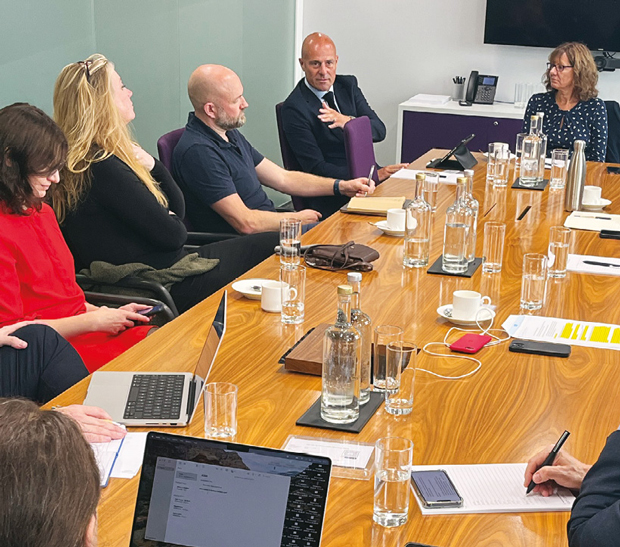FUTURE PLANNING
The Indeed research also found that employers who only react to staffing gaps as they arise are more likely to experience short notice staffing issues, so how can organisations take a more proactive approach?
According to Clement you can put contingencies in place, but ultimately, organisations must determine how sound is the pool of workers? Are there enough people trained up within certain areas, are there enough people on the books to cover? He also pointed out the importance of offering the right basic training, whether it’s in person, micro learning, or other platform-based skills. “Ultimately, investment should be holistic, it can be in technology, or it can be in processes, but pre-empting these issues is crucial.”
Our panel has already deployed a range of technologies, including operative sensors, unity sensors, noise sensors and QR codes to chart cleaning schedules. One participant also cited the use of a type of geofence, which tracks people entering and leaving the building to help monitor workers’ safety out of hours.
But cleaning and other essential frontline services, such as reception and security, rely ultimately on people, and all our FMs reported asking staff to fill in for absentees. According to a panellist, staff often request to work extra hours and explained: “Where there are absences, we will always try and offer it to our own staff first, before backfilling.
“Alongside this where there’s an opportunity to get staff in to do periodic cleans or deep cleans. I’d much rather us use our own staff and find a date that works for them, as opposed to saying, ‘this is the date we’re going to do it’, because otherwise we’ve got to backfill with an agency.”
Long and unsociable hours may put staff more at risk of ill health or injuries, so we asked, where does employment law stand regarding risks to workers?
“An employer has a duty to monitor and keep records of working time,” said Mizzi, “and there are working time regulations about how long people are supposed to work, particularly regarding night work. This means there is a whole host of obligations with which employers should comply. The other aspect is when people have multiple jobs. In an ideal world you’d have some sort of mechanism in place so that you know how many hours they’re working elsewhere.
“The main consideration is that apart from the work and time regulations, you have a general duty to provide a safe system of work, and if you’re requiring somebody to work excessive hours, then that’s more likely to cause breaches of safety.”
According to Clement, if you do use a separate kind of model, you should push that accountability to the supplier. “It goes back to whatever contingency you’ve got in place and whether it is the right one for you or your business. Challenge the process, because even if it’s the one you’re using now, it doesn’t mean that it can’t be improved, can’t change and can’t be done differently to get the best out of your teams.”
SUPPORTING STAFF
We concluded the discussion on the benefits to the sector, the wider business community and society of better supporting frontline workers. Ensuring these staff feel supported was the most practical approach, as a panellist said, whether they’re outsourced or not, “if they can’t get hold of their supervisors, they can always come to me”.
Reflecting on the British Cleaning Council’s campaign to recognise the important role of cleaning operatives, a panellist voiced their frustration that cleaners and security staff are not given the respect they deserve. This is why investing in a flexible solution is worth considering argued Farrier: “If a person wants access to flexible work because that suits their lifestyle our aim is to get them to that work as quickly as possible, so we look at things like journey time and how easy is it for somebody to access the site.”
As the panel concluded, whether frontline staff are outsourced, in-house or hired via a flexible app, it’s all about taking the time to support and recognise their contribution to society.





